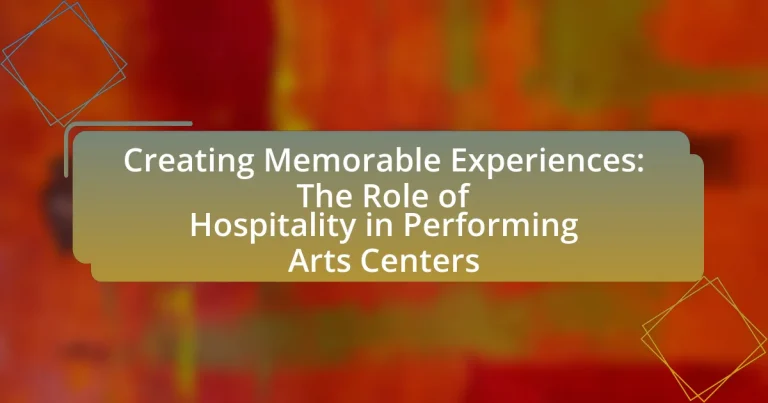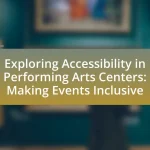The article “Creating Memorable Experiences: The Role of Hospitality in Performing Arts Centers” examines the critical function of hospitality in enhancing visitor experiences at performing arts venues. It highlights how exceptional service, comfortable amenities, and diverse food options contribute to audience satisfaction and retention. Key elements of effective hospitality, such as attentive customer service and seamless logistical support, are discussed alongside the importance of staff training and the integration of technology to personalize experiences. The article also emphasizes the impact of hospitality on the reputation and financial success of performing arts centers, supported by research findings on audience preferences and satisfaction metrics.

What is the role of hospitality in performing arts centers?
The role of hospitality in performing arts centers is to enhance the overall visitor experience by providing exceptional service and amenities. This includes greeting patrons warmly, ensuring comfort through seating and facilities, and offering food and beverage options that cater to diverse preferences. Research indicates that high-quality hospitality can lead to increased patron satisfaction and repeat attendance, as evidenced by a study from the National Endowment for the Arts, which found that 75% of attendees rated their experience positively when hospitality services were prioritized. Thus, effective hospitality directly contributes to the success and reputation of performing arts centers.
How does hospitality enhance the audience experience in performing arts centers?
Hospitality enhances the audience experience in performing arts centers by creating a welcoming and comfortable environment that encourages engagement and enjoyment. This includes attentive customer service, well-maintained facilities, and thoughtful amenities such as food and beverage options, which collectively contribute to a positive atmosphere. Research indicates that 70% of patrons cite service quality as a key factor in their overall satisfaction at events, demonstrating that effective hospitality directly correlates with enhanced audience experiences.
What specific hospitality services are typically offered in performing arts centers?
Performing arts centers typically offer a range of hospitality services including ticketing, concessions, catering, and event planning. Ticketing services facilitate the purchase and management of tickets for performances, ensuring a smooth entry process for patrons. Concessions provide food and beverage options, enhancing the overall experience during events. Catering services may be available for private events or receptions, offering tailored menus to suit various occasions. Event planning services assist in organizing and coordinating events, ensuring that all logistical aspects are handled efficiently. These services collectively contribute to creating memorable experiences for attendees at performing arts centers.
How do these services contribute to a memorable experience for attendees?
Services in performing arts centers enhance the attendee experience by providing comfort, convenience, and personalized interactions. For instance, high-quality customer service ensures that attendees feel valued and attended to, which can lead to positive emotional responses. Additionally, amenities such as comfortable seating, clean facilities, and accessible dining options contribute to an overall enjoyable atmosphere. Research indicates that 70% of attendees cite customer service as a key factor in their satisfaction at events, highlighting its importance in creating memorable experiences.
Why is hospitality important for the success of performing arts centers?
Hospitality is crucial for the success of performing arts centers because it enhances the overall visitor experience, leading to increased attendance and repeat patronage. A welcoming environment, attentive staff, and quality services contribute to audience satisfaction, which is essential for building a loyal customer base. Research indicates that 70% of patrons are likely to return to a venue that provides excellent hospitality, as noted in a study by the National Endowment for the Arts. This positive experience not only encourages word-of-mouth promotion but also boosts revenue through ticket sales and concessions, ultimately supporting the financial viability of performing arts centers.
What impact does exceptional hospitality have on audience retention?
Exceptional hospitality significantly enhances audience retention by fostering a positive emotional connection between the audience and the venue. When patrons experience attentive service, personalized interactions, and a welcoming atmosphere, they are more likely to return for future events. Research indicates that 70% of customers are willing to pay more for better service, highlighting the direct correlation between exceptional hospitality and customer loyalty. Additionally, venues that prioritize hospitality often receive higher satisfaction ratings, which can lead to increased word-of-mouth referrals and repeat attendance. This demonstrates that exceptional hospitality not only improves the immediate experience but also builds long-term relationships with the audience.
How does hospitality influence the overall reputation of a performing arts center?
Hospitality significantly influences the overall reputation of a performing arts center by enhancing visitor experiences and fostering positive word-of-mouth. When patrons receive attentive service, comfortable amenities, and a welcoming atmosphere, they are more likely to enjoy their visit and share their experiences with others. Research indicates that 70% of customers are willing to recommend a venue based on exceptional service alone. This positive feedback can lead to increased attendance and a stronger community presence, ultimately elevating the center’s status in the arts community.

What are the key elements of effective hospitality in performing arts centers?
The key elements of effective hospitality in performing arts centers include attentive customer service, a welcoming atmosphere, and seamless logistical support. Attentive customer service ensures that staff are trained to meet the needs of patrons, enhancing their overall experience. A welcoming atmosphere is created through thoughtful design, cleanliness, and engaging pre-show activities, which contribute to a positive first impression. Seamless logistical support involves efficient ticketing processes, clear signage, and accessible facilities, which facilitate a smooth experience from arrival to departure. These elements collectively enhance patron satisfaction and encourage repeat visits, as evidenced by studies showing that positive customer experiences in cultural venues lead to increased attendance and community support.
How can performing arts centers train staff to provide excellent hospitality?
Performing arts centers can train staff to provide excellent hospitality through comprehensive training programs that focus on customer service skills, empathy, and effective communication. These programs should include role-playing scenarios, workshops on active listening, and training in conflict resolution to prepare staff for diverse audience interactions. Research indicates that organizations with structured training programs see a 24% increase in customer satisfaction ratings, highlighting the effectiveness of such training in enhancing hospitality.
What skills are essential for staff working in hospitality roles at performing arts centers?
Essential skills for staff working in hospitality roles at performing arts centers include excellent communication, customer service, problem-solving, and teamwork. Communication skills are vital for effectively interacting with patrons and conveying information about events. Customer service skills ensure that guests have a positive experience, which is crucial in a hospitality setting. Problem-solving abilities allow staff to address any issues that arise promptly, maintaining a smooth operation. Teamwork is essential as hospitality staff often work in collaboration with other departments to create a cohesive experience for attendees. These skills collectively contribute to creating memorable experiences in performing arts centers.
How can ongoing training improve the quality of hospitality services?
Ongoing training enhances the quality of hospitality services by equipping staff with the latest skills and knowledge necessary to meet customer expectations effectively. This continuous education fosters improved communication, service delivery, and problem-solving abilities among employees, which directly impacts guest satisfaction. For instance, a study by the American Hotel and Lodging Educational Institute found that establishments with regular training programs reported a 20% increase in customer satisfaction scores. By investing in ongoing training, hospitality organizations can ensure that their staff remains adept at providing exceptional service, ultimately leading to a more memorable experience for guests in performing arts centers.
What role does technology play in enhancing hospitality experiences?
Technology plays a crucial role in enhancing hospitality experiences by streamlining operations and personalizing guest interactions. For instance, mobile applications enable guests to check in, order services, and access information seamlessly, improving convenience and satisfaction. Additionally, data analytics allows hospitality providers to tailor services based on individual preferences, leading to a more customized experience. According to a study by the Cornell University School of Hotel Administration, hotels that implement technology-driven personalization see a 10-15% increase in guest satisfaction scores. This demonstrates that technology not only improves operational efficiency but also significantly enhances the overall guest experience in hospitality settings.
How can ticketing systems improve customer service in performing arts centers?
Ticketing systems can significantly improve customer service in performing arts centers by streamlining the ticket purchasing process and enhancing communication with patrons. These systems enable quick and easy access to ticket information, allowing customers to select seats, view pricing, and make purchases online without delays. Additionally, ticketing systems often include features such as automated confirmations and reminders, which help reduce no-shows and keep patrons informed about event details. Research indicates that 70% of customers prefer online ticket purchasing due to its convenience, which directly correlates with higher satisfaction rates in customer service experiences. By integrating customer feedback mechanisms, ticketing systems also allow performing arts centers to gather insights and make data-driven improvements, further enhancing the overall customer experience.
What technological innovations are being used to personalize the audience experience?
Technological innovations such as artificial intelligence, data analytics, and mobile applications are being used to personalize the audience experience in performing arts centers. Artificial intelligence enables venues to analyze audience preferences and behaviors, allowing for tailored recommendations and targeted marketing strategies. Data analytics provides insights into audience demographics and engagement patterns, facilitating customized experiences based on individual interests. Mobile applications enhance personalization by offering features like personalized event notifications, interactive seating maps, and the ability to pre-order concessions, thereby improving overall audience satisfaction. These innovations collectively contribute to creating memorable experiences by ensuring that each audience member feels valued and catered to.

How can performing arts centers measure the effectiveness of their hospitality efforts?
Performing arts centers can measure the effectiveness of their hospitality efforts through guest feedback surveys and performance metrics. By collecting data from audience members regarding their experiences, centers can identify strengths and areas for improvement in their hospitality services. For instance, a study by the National Endowment for the Arts found that 70% of attendees who rated their experience positively cited staff friendliness and attentiveness as key factors. Additionally, analyzing ticket sales, repeat attendance rates, and social media engagement can provide quantitative insights into how hospitality impacts overall patron satisfaction and loyalty.
What metrics can be used to evaluate audience satisfaction with hospitality services?
Metrics used to evaluate audience satisfaction with hospitality services include customer satisfaction surveys, Net Promoter Score (NPS), and online reviews. Customer satisfaction surveys provide direct feedback on specific aspects of the hospitality experience, allowing for quantitative analysis of satisfaction levels. The Net Promoter Score measures the likelihood of customers recommending the service to others, serving as an indicator of overall satisfaction and loyalty. Online reviews on platforms such as TripAdvisor or Yelp aggregate customer opinions and ratings, offering insights into audience perceptions and experiences. These metrics collectively enable hospitality providers to assess and enhance service quality effectively.
How can feedback from patrons inform improvements in hospitality practices?
Feedback from patrons can significantly inform improvements in hospitality practices by providing direct insights into their experiences and expectations. This feedback allows hospitality managers to identify specific areas needing enhancement, such as service quality, staff interactions, and facility conditions. For instance, a study by the Cornell University School of Hotel Administration found that guest feedback directly correlates with operational adjustments, leading to increased customer satisfaction and loyalty. By systematically analyzing patron reviews and suggestions, hospitality providers can implement targeted changes that enhance the overall guest experience, thereby fostering a more welcoming and efficient environment in performing arts centers.
What role do surveys and reviews play in assessing hospitality effectiveness?
Surveys and reviews are critical tools for assessing hospitality effectiveness in performing arts centers. They provide direct feedback from patrons regarding their experiences, allowing management to identify strengths and weaknesses in service delivery. For instance, a study by the Cornell University School of Hotel Administration found that customer feedback significantly influences operational improvements and guest satisfaction levels. By analyzing survey data and online reviews, hospitality managers can make informed decisions to enhance service quality, ultimately leading to improved guest experiences and increased loyalty.
What best practices can performing arts centers adopt to enhance hospitality?
Performing arts centers can enhance hospitality by implementing personalized guest services, ensuring staff training in customer service, and creating a welcoming environment. Personalized guest services, such as pre-show communications and tailored experiences, can significantly improve audience satisfaction. Staff training in customer service equips employees with the skills to address guest needs effectively, leading to positive interactions. Additionally, a welcoming environment, characterized by comfortable seating, clear signage, and accessible facilities, contributes to an overall enjoyable experience for patrons. These practices are supported by studies indicating that enhanced customer service and a positive atmosphere directly correlate with increased patron loyalty and satisfaction in the arts sector.
How can performing arts centers create a welcoming atmosphere for diverse audiences?
Performing arts centers can create a welcoming atmosphere for diverse audiences by implementing inclusive programming, accessible facilities, and community engagement initiatives. Inclusive programming ensures that performances reflect a variety of cultures and perspectives, which can attract a broader audience. Accessible facilities, including ramps, designated seating, and sensory-friendly options, cater to individuals with disabilities, enhancing their experience. Community engagement initiatives, such as outreach programs and partnerships with local organizations, foster a sense of belonging and encourage participation from underrepresented groups. Research indicates that venues prioritizing inclusivity see increased attendance and audience satisfaction, demonstrating the effectiveness of these strategies in creating a welcoming environment.
What strategies can be implemented to ensure consistency in hospitality services?
To ensure consistency in hospitality services, implementing standardized training programs for staff is essential. These programs should cover service protocols, customer interaction techniques, and problem-solving strategies, ensuring that all employees deliver a uniform experience. Research indicates that organizations with comprehensive training see a 24% increase in customer satisfaction scores, highlighting the effectiveness of such initiatives. Additionally, regular performance evaluations and feedback mechanisms can help maintain service quality by identifying areas for improvement and reinforcing best practices among staff.


